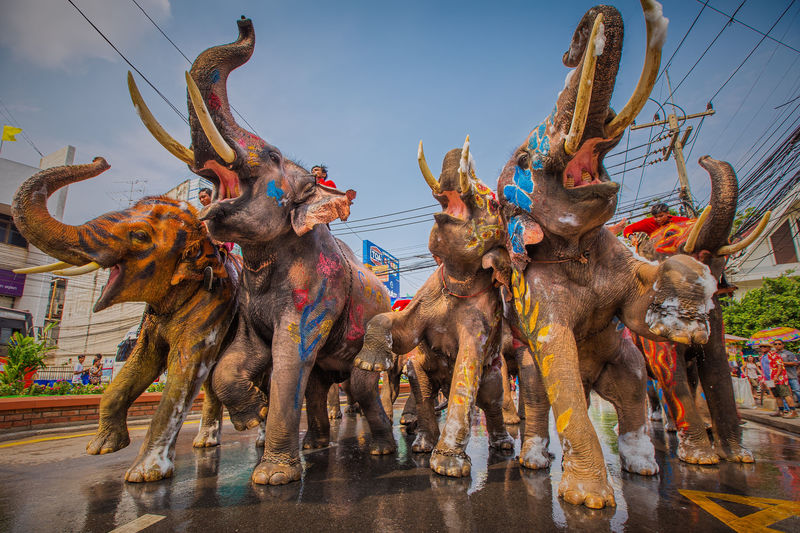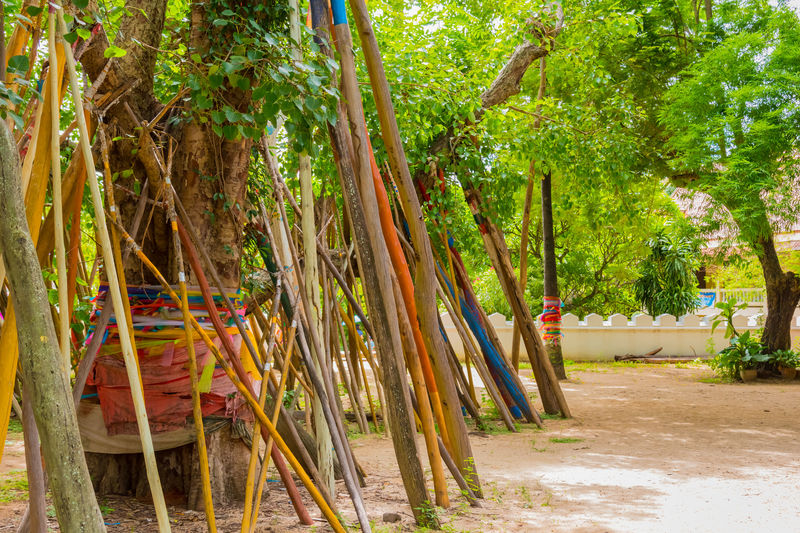
Water skirmishes continue well into the evening
Songkran comes from a Sanskrit word meaning ‘approaching’ or ‘pass into’. Signifying the birth of the new year, Siamese people – largely family-oriented – celebrate it by splashing, which is an important element in the celebration. It is also a time to value and appreciate family, and to spend time with loved ones. Devotees in the predominantly Buddhist country, pay their respects in various temples (Wat)s by pouring water on images of Buddha and the hands of Buddhist monks.
Depending on where you go, this grand and joyous celebration can last from three to ten days. Soaking in your surroundings, you’ll be likely to spot fellow tourists shrieking with glee, saffron-clad monks with darkened robes from sprays of scented water; drenched store owners wandering into the crossfire of water guns, the elderly joining the high-spirited throng, and zealous devotees paying their respects at numerous temples. The air is filled with a sweet, flowery scent, while the cement roads and buildings are drenched in water, staving off the heat during the country’s hottest season.
Colours are added to the mélange; truly a spectacle that cannot be missed. You would do well to bring a rain sleeve for your camera or a Ziploc bag, should you decide to capture the magic of the festival. Magical and awe-inspiring moments define one’s travel experience, enkindling passion and forging unforgettable memories.
Origins
Some time ago, much like today’s practices, the Siamese people would visit local monasteries and provide offerings of food to the monks who resided there. Scented water would also be poured over monks as a way of holy cleansing, which would then be collected and poured over one another as the water was believed to be blessed. Do not be surprised if you are doused with a bucket full of chalky, colourful water or receive a faceful of colourful paste. This is seen as a mark of blessing, likely picked up from the Buddhist rituals of using chalk to mark blessings.
However, one would have to ask, what’s so significant about throwing water? As of most of the Southeast Asian region, water is an indispensable element in many societies. Many civilisations were founded in river valleys; ancient Mesopotamia formed in the valleys of the Tigris and the Euphrates, ancient China on the Yangtze River and Indus on the floodplains of the Indus River.

Water skirmishes continue well into the evening
This festival of rejuvenation and renewal is said to originate from the ancient Indian festival of Makara Sankranti or Maghi, a festival dated in the Hindu calendar and observed in January to worship the deity Surya. There is even a Hindu myth tied to the origins of Songkran: it depicts a young man, Dhammaban, whose bizarre intelligence enabled him to understand the language of birds. One day, Brahma (a Hindu God) decided to test his intelligence by asking him “Where is the aura of a male in the morning, afternoon and night?”
If he was unable to answer, his head would be chopped off, though if he answered correctly, Brahma would decapitate Himself. Pressured to seek the answer, the young man was fortunate enough to overhear a conversation between two birds, one of which knew the right answer to the question. Then, he sought Brahma and told him:
In the morning, the glory of man was on his face because a man has to wash his face every morning.
In the afternoon, the glory of man would be on his chest or body since one bathes.
In the evening, the glory of man is on the feet as a man must wash his feet before going to bed.
Brahma was bound by word to cut off His own head but knew if His head rolled on the earth, it would summon an inferno. Therefore, he instructed his seven daughters to transport it to Mount Kailash, the abode of the god Shiva. Once a year, each of the daughters takes turns to carry the head in procession around the mountain, with several gods and goddesses in attendance as a celebration of prosperity and joy of humans.
In Search Of The Best
The nationwide celebration is no doubt a cause to visit. Once there, why not go for the loudest, craziest and most colourful celebration? Chiang Mai, a city in the mountainous northern region of Thailand, is perhaps your best bet to enjoy the biggest and longest running celebration – six days – in the country. Kicking off the celebration at Thapae Gate, you will be able to witness yet another traditional ritual, the building of sand castles. The tradition of carrying sand and building sand castles is to honour Buddhism to ward off bad karma.
There is also a procession of crutching the Bodhi tree, called Mai-Khum Saree, using long pieces of wood. According to the Buddhist scriptures, Buddha achieved enlightenment under the Bodhi tree. Seen as sacred and as a symbol of longevity, devotees believe that supporting the tree is a sign of respect. Head towards Naowarat Bridge and join in the procession, where dozens of Buddha images are carried around the old city.
Since the ancient city is surrounded by a square-shaped moat, no one is safe from getting drenched. The tuk-tuks and pickup trucks play another role during this day. Aside from ferrying people, they act as refill stations, carrying barrels of water around the city. A constant supply of ammunition ensures water skirmishes continue well into the evening. You can go around on your moped, join the throng on foot, or hop on a vehicle and do a water drive-by, the choice is yours!
The locals would also throw foam into the mix. You are likely to find large machines spewing clouds of bubbles onto the street. Just remember to keep your mouth closed – a near impossible feat as you will be having so much fun – or risk falling sick. You can’t be certain whether the water is clean or contaminated. Don’t let that put a dent in your celebration though, form a team or be a lone wolf and snipe anyone with your water blaster without remorse. Just use your judgement to avoid being disrespectful and you will likely have the time of your life!

Devotees would crutch Bodi trees as a sign of respect


